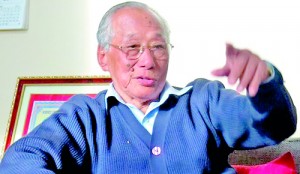Sunday Times 2
India’s oldest MP calls it a day, says parliament today is waste of time
Rishang Keishing still remembers the first time he travelled to work as a newly elected MP in India’s first parliament, in 1952.
He made the journey by bicycle, but as he crossed Delhi’s busy Connaught Place, he was pulled over by the police.
“They told me it was one-way traffic and I was going the wrong direction,” says the MP who represents the remote north-eastern state of Manipur. “I told them we didn’t have such things where I am from, but I said I’m sorry and they let me go.”

Rishang Keishing is nostalgic, but also despondent about how parliament has turned out
Now 94 and preparing to retire as India’s and the world’s oldest MP, Mr Keishing is understandably nostalgic about the past, but also gloomily despondent about how the country’s parliament has turned out.
It’s so often suspended now because of rowdy and sometimes violent interruptions from disruptive lawmakers, it’s hardly news any more.
Things reached a nadir recently when an MP from the ruling Congress party used pepper spray to try to stop a bill passing, putting several other members in hospital.
“It used to be quiet like a temple or a church, and the debates were listened to intently,” remembers Mr Keishing. “There is no house decorum now and the Speaker is no longer respected” — turning the modern Indian parliament into “a waste of time”, he says.
The photographs covering the walls of his home in Manipur look like a memorial now to those more genteel times. Pride of place goes to a photograph of the first parliament, from 1952 to 1957, with a much younger Mr Keishing at one side and India’s first prime minister Jawaharlal Nehru at the center.
Least productive
But Mr Keishing’s criticism is not just the wistful talk of an elder statesman.
Records show the past five years of India’s parliament, its 15th since independence, have been the least productive ever – with only just over half the 327 bills tabled being passed.
Days of debating time have been lost to suspensions, and the Congress-led government has resorted to using so-called ordinance powers to enact legislation outside parliamentary time – mirroring President Obama’s controversial use of executive orders to bypass a gridlocked US Congress – further undermining faith in democratic procedure.
Just as in the United States, voters are ever more disillusioned with those who purport to represent them.
Some critics say many Indian politicians act exactly what they are: businessmen and accused criminals.
Many MPs have become politicians to further their business interests. And at least a third of the current crop of MPs is charged with some kind of crime, some as serious as attempted murder and major fraud. But they use their positions of power to keep dodging the courts. And despite promises of reform from all the main parties, the number of “criminal politicians” has risen at each election.
There are occasional hints of introspection. Marking the 60th anniversary of parliament two years ago, the Congress party leader Sonia Gandhi remarked that its “journey had not always been smooth or without challenge”.
But as this most recent – and most wasteful – parliamentary session came to an end, MPs indulged in a bout of self-congratulation, says Madhu Trehan, editor of website NewsLaundry, “even singing poetry to each other. It was terrible.”
Yet the supposedly better parliamentary standards during Nehru’s time were, in some ways, an aberration, says Ms Trehan.
‘Everyone is a hero’
Nehru was influenced by his experience of British and American legislative traditions, which modern Indian politicians would be more likely to hide than highlight.
“We are not an obedient people,” says Ms Trehan, quoting a Hindi phrase which translates as “Everyone is a Hero”. So Indian MPs are bound to “shout and scream, because they always think they’re right”.
The modern parliament also reflects positive changes in Indian society, she argues. “Feudal systems are being turned upside down and lower castes are in power.”
That also means many Indian MPs are “uneducated”.
The biggest danger she sees is in how difficult it is becoming to report on India’s politicians.
“Free speech in India is in true danger,” she warns, “and we don’t have democracy if this doesn’t change.”
Hers is a widely shared concern right now, as the elections approach, amid frequent accounts of journalists being pressured to stop raising sensitive topics – often by their employers.
Much of the criticism has focused on supporters of the opposition BJP’s prime ministerial candidate Narendra Modi, for allegedly trying to silence questions about his failure to stop riots in his home state of Gujarat in 2002 in which at least 1,000 people – mostly Muslim – died.
But backers of India’s newest movement, the Aam Admi or Common Man party, have also come under attack for being intolerant of criticism.
And the ruling Congress party has hardly set an example of accountability. In his 10 years in office, Prime Minister Manmohan Singh has held just three press conferences while party leader Sonia Gandhi never does interviews.
Rishang Keishing is preparing to devote more time to local school projects in his retirement. He’s still in good health, which he attributes to “a life of no vices – no smoking and no drinking”.
His message is that it’s time for India’s democracy to go through a detox.
“We have to serve people without expecting anything from them,” he says, or the country is in danger. “It is democracy that is keeping us together: different religions, different languages and different cultures. In this country, that is the beauty of democracy.”
Courtesy BBC.com


